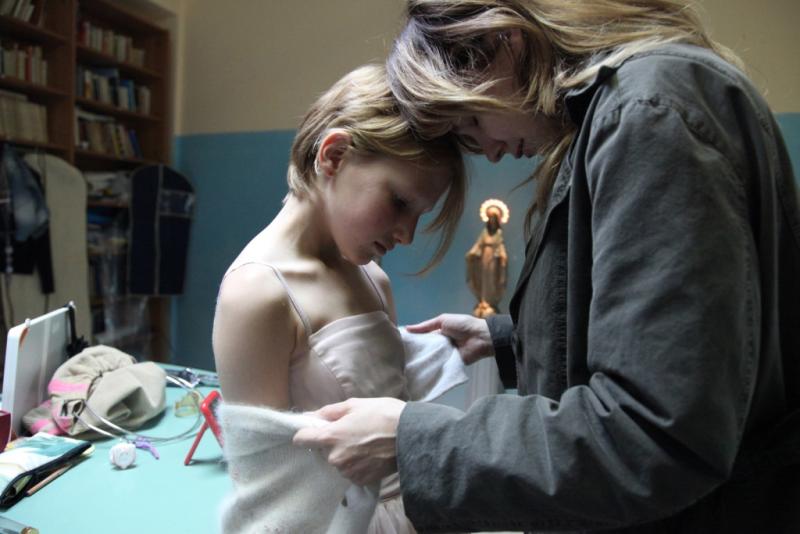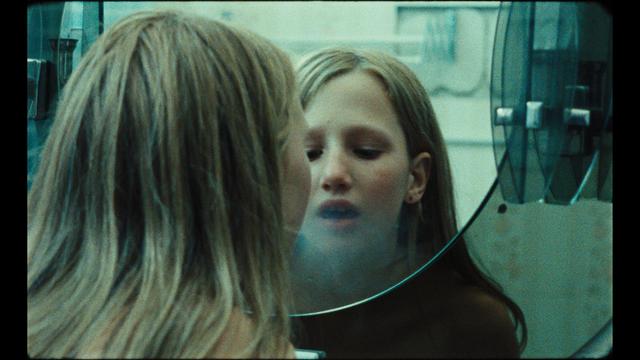Corpo Celeste | reviews, news & interviews
Corpo Celeste
Corpo Celeste
A quirky and original tale of sexual and spiritual awakening in Southern Italy

Now here is something genuinely original and genuinely innovative coming out of Italian cinema, a very welcome surprise. Alice Rohrwacher’s debut feature film has a freshness of outlook and a sharpness of overview that could put many of her more venerable rivals in Italy to shame.
Corpo Celeste – Heavenly Body – based on the novel by acclaimed Anna Maria Ortese - recounts the story of 13-year-old Marta (Yle Vianello) and her somewhat traumatic return to the city of her birth in Southern Italy after spending the last 10 years in Switzerland as the daughter of poor immigrants. The most important features of her new life in Reggio Calabria – the region's largest, and most socially dysfunctional, city facing Sicily across the dramatically beautiful Straits of Messina – are her ongoing spiritual preparation for “la Cresima”, the Italian Catholic equivalent of Confirmation. The social interactions that derive from that experience offer her a portal into the strange, chaotic city in which she finds herself.
The region of Calabria, and especially its largest city, is in some ways a movie-maker’s dream
Postwar Italian cinema – from its largely glorious Neo-Realist golden era to the creative doldrums of the last generation of film-makers, in everything from the most tragic social docudramas to the corniest of comedies – has heavily trawled themes like immigration, social marginalisation, the trials of puberty and incipient adolescence, greed and hypocrisy in the church and all numerous variants on religious experience, yet the Florentine-raised Rohrwacher has managed to come up with some interesting twists on all of them.
The region of Calabria, and especially its largest city, is in some ways a movie-maker’s dream: the contrast between stark natural beauty (breathtaking cliffs and mountainous terrain overlooking deep blue, though often polluted, seas) and the unbridled lawlessness of illegal construction and contempt for basic civic norms regarding refuse disposal, driving and parking, and the resultant clash between the atavistic peasant tradition (which still survives in the smaller, more isolated villages) and the cynical worldliness of its cities (amongst the ugliest in Italy) all provide very rich pickings. And that’s not to mention the daily climate of fear provided by the presence of the ‘Ndrangheta, Calabria’s even scarier answer to the Sicilian Mafia.
 But rather than taking on Calabria’s spectacular pile of problems in the style of the “cinema di denuncia” – the politicised cries of outrage so popular in 1970s Italian cinema - Rohrwacher seems interested in recounting Marta’s much quirkier and more subjective impressions of her new surroundings, heightened not only by puberty but above all by her rather odd sense of spiritual awakening.
But rather than taking on Calabria’s spectacular pile of problems in the style of the “cinema di denuncia” – the politicised cries of outrage so popular in 1970s Italian cinema - Rohrwacher seems interested in recounting Marta’s much quirkier and more subjective impressions of her new surroundings, heightened not only by puberty but above all by her rather odd sense of spiritual awakening.
Just as Italy’s best-known satirical film-maker Nanni Moretti avoided a head-on ideological scrap with the Vatican in his recent We Have a Pope, Rohrwacher depicts without moral outrage – or cynicism – how the local leaders of the Catholic church in Southern Italy are managing their own precipitous decline, both in terms of political and social influence, and of bums on seats. However, those who still believe (in a heady idiosyncratic mix of religion and pure superstition) tend to allow their lives to be run by it.
Apart from her mother (Anita Caprioli), the woman who most influences Marta's growth is Santa (Pasqualina Scuncia), the eccentric lady who runs the catechism course for Don Mario (Salvatore Cantalupo), the somewhat detached local priest, who is attempting to run his church as a sort of rackety business. “Seeing the Holy Spirit is like observing the world through a pair of really cool sunglasses,” offers Santa, helpfully.
The Vatican has given Corpo Celeste the nod, and Italy’s most prestigious film awards, Il Nastro d’Argento, gave Rohrwacher the Best New Director prize 2011.
Watch the trailer for Corpo Celeste
rating
Explore topics
Share this article
The future of Arts Journalism
You can stop theartsdesk.com closing!
We urgently need financing to survive. Our fundraising drive has thus far raised £49,000 but we need to reach £100,000 or we will be forced to close. Please contribute here: https://gofund.me/c3f6033d
And if you can forward this information to anyone who might assist, we’d be grateful.

Subscribe to theartsdesk.com
Thank you for continuing to read our work on theartsdesk.com. For unlimited access to every article in its entirety, including our archive of more than 15,000 pieces, we're asking for £5 per month or £40 per year. We feel it's a very good deal, and hope you do too.
To take a subscription now simply click here.
And if you're looking for that extra gift for a friend or family member, why not treat them to a theartsdesk.com gift subscription?
more Film
 One Battle After Another review - Paul Thomas Anderson satirises America's culture wars
Leonardo DiCaprio, Teyana Taylor, and Sean Penn star in a rollercoasting political thriller
One Battle After Another review - Paul Thomas Anderson satirises America's culture wars
Leonardo DiCaprio, Teyana Taylor, and Sean Penn star in a rollercoasting political thriller
 Steve review - educator in crisis
Cillian Murphy excels as a troubled headmaster working with delinquent boys
Steve review - educator in crisis
Cillian Murphy excels as a troubled headmaster working with delinquent boys
 Can I get a Witness? review - time to die before you get old
Ann Marie Fleming directs Sandra Oh in dystopian fantasy that fails to ignite
Can I get a Witness? review - time to die before you get old
Ann Marie Fleming directs Sandra Oh in dystopian fantasy that fails to ignite
 Happyend review - the kids are never alright
In this futuristic blackboard jungle everything is a bit too manicured
Happyend review - the kids are never alright
In this futuristic blackboard jungle everything is a bit too manicured
 Robert Redford (1936-2025)
The star was more admired within the screen trade than by the critics
Robert Redford (1936-2025)
The star was more admired within the screen trade than by the critics
 Blu-ray: The Sons of Great Bear
DEFA's first 'Red Western': a revisionist take on colonial expansion
Blu-ray: The Sons of Great Bear
DEFA's first 'Red Western': a revisionist take on colonial expansion
 Spinal Tap II: The End Continues review - comedy rock band fails to revive past glories
Belated satirical sequel runs out of gas
Spinal Tap II: The End Continues review - comedy rock band fails to revive past glories
Belated satirical sequel runs out of gas
 Downton Abbey: The Grand Finale review - an attemptedly elegiac final chapter haunted by its past
Noel Coward is a welcome visitor to the insular world of the hit series
Downton Abbey: The Grand Finale review - an attemptedly elegiac final chapter haunted by its past
Noel Coward is a welcome visitor to the insular world of the hit series
 Islands review - sunshine noir serves an ace
Sam Riley is the holiday resort tennis pro in over his head
Islands review - sunshine noir serves an ace
Sam Riley is the holiday resort tennis pro in over his head
 theartsdesk Q&A: actor Sam Riley on playing a washed-up loner in the thriller 'Islands'
The actor discusses his love of self-destructive characters and the problem with fame
theartsdesk Q&A: actor Sam Riley on playing a washed-up loner in the thriller 'Islands'
The actor discusses his love of self-destructive characters and the problem with fame
 Honey Don’t! review - film noir in the bright sun
A Coen brother with a blood-simple gumshoe caper
Honey Don’t! review - film noir in the bright sun
A Coen brother with a blood-simple gumshoe caper

Add comment